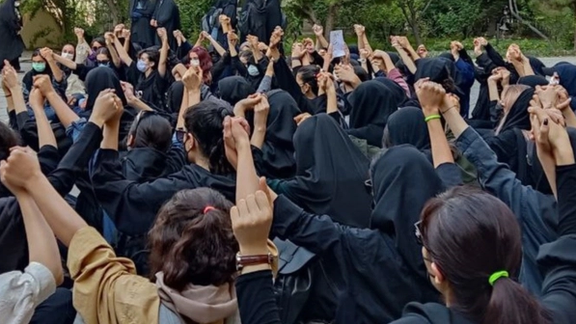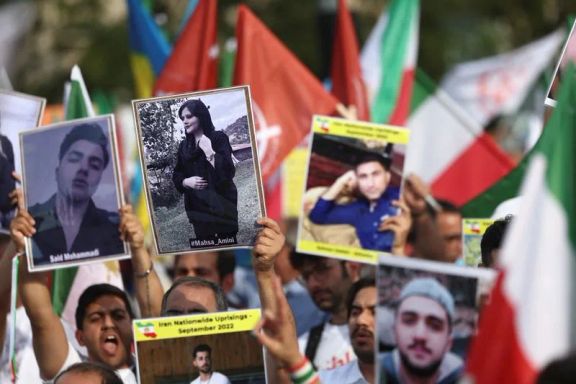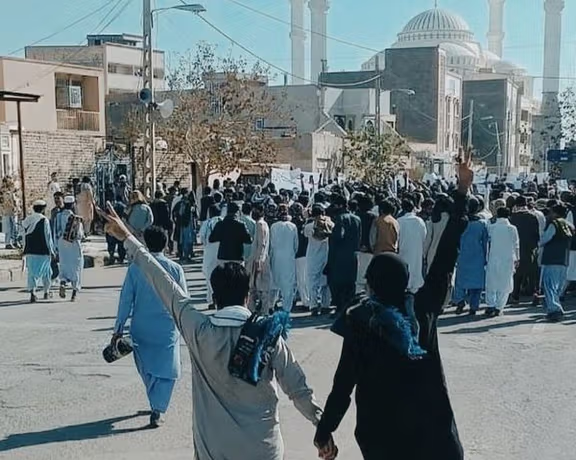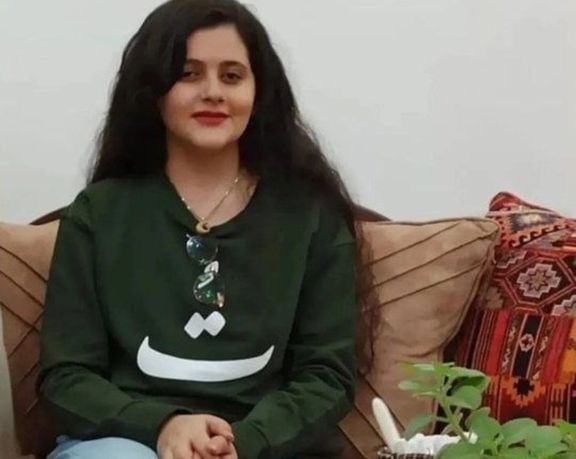Father Of Mahsa Amini On House Arrest On Anniversary Her Death

On the first anniversary of his daughter's death, the father of Mahsa Amini was briefly arrested, the latest in a line of arrests over recent weeks.

On the first anniversary of his daughter's death, the father of Mahsa Amini was briefly arrested, the latest in a line of arrests over recent weeks.
Amjad Amini was apprehended by IRGC agents shortly after leaving his home on Saturday and taken to an undisclosed location before he was released and put under house arrest later in the day.
"Security forces detained Amjad Amini today and returned him to his house after threatening him against marking his daughter's death anniversary," A Kurdish human rights group said.
Mahsa Amini's mother's residence is currently surrounded, resembling a military compound, and security measures have been significantly increased in Kurdish-populated regions.
Her uncle has also in recent weeks been arrested with multiple threats levied to her brother as the family is subjected to constant pressure not to gather in remembrance of her death in morality police custody hands one year ago.
Social media has been inundated with images and reports depicting an unprecedented security presence in Kurdish provinces and major cities, including Tehran, Karaj, Rasht, and Tabriz. The Kurdish human rights networks have indicated that Iranian security forces are preventing non-local individuals from entering Mahsa's hometown, including her cemetery.
Checkpoint inspections have been established at the entrances to all Kurdish-populated cities, resulting in significant traffic congestion and thorough searches of both passengers and vehicles.

Students from four universities in Tehran have released statements in support of the Women, Life, Freedom protests and to mark the anniversary of Mahsa Amini's death.
In the statements, students from Science and Technology University, Amir Kabir, Beheshti and Khajeh Nasir Toosi Universities underlined that the women's rights protests signify a "public outpouring of frustration against the Islamic Republic."
Students have been at the forefront of protests since the death in morality police custody of 22-year-old Mahsa Amini, with many students arrested and barred from continuing their studies for speaking out against the regime and refusing to wear mandatory hijab on campus.
Students at the Beheshti University reaffirmed their unwavering commitment to the cause, emphasizing their resolute support for resistance despite witnessing violence and hostility.
Students from Science and Technology University recalled the events of the past year when "innocent blood was shed, and our patience was tested," leading to a unified call for justice for Mahsa whose killers have still not been brought to justice. The regime claims she died of a pre-existing condition, but scans revealed she had suffered fatal blows to the head.
AmirKabir University of Technology students explicitly stated their opposition to various forces undermining freedom, such as “the Supreme Leader, the IRGC, paramilitary organizations, monarchy, the Mujahedin-e Khalq, centralization, and any form of tyranny or totalitarianism.”
Meanwhile, students from Khajeh Nasir Toosi University of Technology voiced their support, declaring their challenge to the system.

Western powers imposed more sanctions on Iran Friday, highlighting the brutality of the Islamic Republic on the one-year anniversary of the death of Mahsa Amini.
The United States, The United Kingdom, Canada and the European Union also issued a series of statements voicing support for the Iranian people and women and condemning the government for violence against its own population.
“Jill and I join people around the world in remembering her—and every brave Iranian citizen who has been killed, wounded or imprisoned by the Iranian regime for peacefully demanding democracy and their basic human dignity,” President Joe Biden said in a statement.
Amini, 22, was arrested because the hijab police felt her hair wasn’t covered properly. She was hit on the head in custody and died in hospital on 16 September 2022.
People took to the streets in anger and disbelief, first at Mahsa’s hometown of Saqqez in the Kurdistan province and then all over Iran. More than 500 were killed and tens of thousands were arrested in the weeks that followed, as armed police and loyal thugs joined forces to save the regime from the most serious popular challenge to its authority since 1979.
Commemorating Mahsa and the months-long anti-regime protests in Iran, the governments of US, UK and EU announced new rounds of sanctions that would target “some of Iran’s most egregious human rights abusers”, in the words of President Biden.
Those sanctioned by the US include high-ranking members of the IRGC, the head of Iran’s Prisons Organization, and officials linked to Iran’s internet blockade. The English state channel (PressTV) and two IRGC-affiliated media (Fars and Tasnim) were on the list too.
The US Treasury said in a statement that it will take more “collective action against those who suppress Iranians’ exercise of their human rights.”
Britain separately sanctioned senior officials with connection to enforcing mandatory hijab, including the minister for Culture and Islamic Guidance, who has taken action against actresses and businesses for defying the mandatory hijab. Also on the UK list are the Mayor of Tehran, and the Police Spokesman, who has threatened to impound vehicles whose driver or passengers choose to not cover their hair.
The UK Foreign Secretary, James Cleverly, commended the bravery of Iranian women and reaffirmed the UK's unwavering commitment to supporting the Iranian people's pursuit of fundamental rights.
However, the UK has refused to designate Iran's notorious Revolutionary Guard as a terrorist organization and together with the United States have not pursued the prolongation of UN restrictions on Iranian missile exports that will expire in October.
Some commentators were quick to point out, however, that the UK government's actions speak louder than their words.
Kasra Aarabi, Director of UANI (United Against a Nuclear Iran) reminded Cleverly that the UK government had refused to add IRGC to its list of terrorist organizations. He wrote on X (formerly twitter): “UK Foreign Office's explicit opposition to IRGC proscription not only puts UK lives at risk, it’s given IRGC a propaganda victory before the anniversary of Mahsa Amini’s murder.”
Similar criticisms were leveled at Biden, whose nice words for ‘courageous people of Iran’ have coincided with a secretly negotiated prisoner swap which would see $6 billion handed to the repressive regime.
Jonathan Schanzer of Foundation for Defense of Democracies wrote on X:
“US Imposes Sanctions on the Anniversary of Mahsa “Zhina” Amini’s Death — after authorizing $6 billion in ransom payments that will only serve to boost the coffers of this rotten regime. The strategic incoherence is staggering.”
The prisoner swap seems to be imminent. If it happens on or around 16 September, it would no doubt gobble up precious airtime and overshadow the ‘anniversary’.
Iran has faced growing international isolation and sanctions due to its human rights violations and the supply of UAV technology to Russia for use in Ukraine. Notably, Iran was removed from the UN Commission on the Status of Women in December 2022.

Iranian expatriates marched in Brussels on the eve of the first anniversary of Mahsa Amini, a 22-year-old woman whose death in custody ignited Iran’s biggest anti-regime protests.
Thousands of demonstrators, holding up pictures of Amini and many others killed in the protests, called for the overthrow of Iran's theocracy and the establishment of a democratic republic.
Organizers said they had also demanded a unified European Union policy to hold Iran's Shiite clerical rulers accountable for abuses.
Iranian communities in several European cities have kept several rounds of rallies in support of protests in Iran and to demand the closure of Islamic Republic’s missions in Europe.
The protests that followed the death of Amini, arrested for allegedly flouting the Islamic Republic's mandatory dress code, spiraled into the biggest show of opposition to the Iranian authorities in years.
Over 500 people including 71 minors were killed, hundreds injured and thousands arrested, rights groups say, in unrest that was eventually crushed by security forces.
The Tehran government has accused the United States and Israel and their local agents of fomenting the unrest to destabilize Iran.
Iranians are bracing for rallies on Saturday while regime forces have been deployed at strategic regions. Heavily armed military forces have been stationed in restive areas, particularly in Kurdish majority cities, and anti-riot police forces are mushrooming on streets of major cities.

The people of Zahedan in southeastern Iran continued their weekly protests on Friday, on the eve of anticipated rallies for the anniversary of Mahsa Amini's death in custody.
This marked the 50th consecutive week of street protests in this Sunni-majority city following sermons delivered by their Friday prayer leader, Mowlavi Abdolhamid.
During the demonstrations, participants voiced their discontent with the regime and its leader, Ali Khamenei, while also displaying signs of support for the upcoming Saturday rallies. The Revolutionary Guards and its paramilitary wing Basij were among the targets of their slogans. Reports on social media indicate that several individuals were arrested during Friday's demonstrations.
The Sunni leader of Zahedan, known for his passionate criticism of the regime, addressed Mahsa Amini's death during his Friday sermons. Her death on September 16th last year at the hands of the morality police sparked months of anti-government protests, constituting the most significant opposition against the Islamic regime since its establishment in 1979.
"Why should someone be killed for not wearing a hijab?" Abdolhamid questioned, highlighting that protesters are not subjected to lethal force or violence elsewhere in the world. Approximately 600 people lost their lives during the regime's crackdown on protests, with hundreds suffering injuries that resulted in blindness or permanent damage as security forces opened fire on demonstrators.
Abdolhamid implicitly referred to a recent meeting between Iran's Supreme Leader and a group of Baluch people aimed at pacifying the community, which has been protesting since the government's violent crackdown last September, known as "Bloody Friday." On September 30, 2022, about 100 citizens, including women and children, lost their lives due to direct gunfire from military and security forces, with many succumbing to head and chest injuries.
Abdolhamid appealed to the authorities, urging them to release political prisoners and ensure justice is served for the perpetrators of Bloody Friday if they genuinely aim to ease tensions within the community.
Commending what he referred to as an "awakening" in Iranian society, the outspoken cleric stated, "Today, Iranians from all backgrounds, ethnicities, and religious affiliations have united" against 44 years of failed policies by the Islamic Republic. He asserted that "awakening signifies the commencement of victory and progress for any nation."
Similar sentiments were echoed by other activists and community leaders, including Iran's exiled prince, Reza Pahlavi, who interacted live with people through his Instagram page later in the day. Pahlavi, a prominent figure in the current wave of protests, emphasized that individuals from all walks of life and regions of the country have collectively rejected the Islamic Republic.
The son of the last Shah of Iran, who has long advocated for a secular and democratic Iran rather than a monarchy restoration, has been engaging in international outreach efforts to garner global support for what he terms the "Iranian revolution." He reiterated his call for a substantial turnout during Saturday's protests, asserting that "freedom is within reach" if people unite against the regime.
In recent weeks, the regime has intensified its efforts to suppress dissent as part of a broader intimidation campaign aimed at discouraging protests, resulting in the arrest of dozens of individuals this week. Security measures have escalated in anticipation of the first anniversary of Mahsa Amini's death and the start of the Women, Life, Freedom protests. Heavily armed military forces have been deployed in restive regions, particularly in Kurdish-majority cities, and anti-riot police forces have become increasingly visible on the streets of major cities.

The US and Britain on Friday imposed sanctions on Iran ahead of the one-year anniversary of Mahsa Amini’s death, which sparked months of protests that faced a violent crackdown.
Amini’s death on September 16 last year at the hands of the morality police sparked months of anti-government protests that marked the biggest show of opposition to the Islamic regime since 1979. Iranian security forces have been deployed in her hometown and elsewhere in anticipation of unrest this weekend.
The United States and Britain, along with the European Union, have imposed multiple rounds of sanctions against Iran, for widespread and often violent crackdown on protests.
The US Treasury Department in a statement Friday said it imposed sanctions on more than two dozen people and entities it said were connected to Iran's "violent suppression" of protests and crackdown on dissenting voices and restrictions to internet.
The action targets 29 people and groups, including 18 key members of the Islamic Revolutionary Guard Corps (IRGC) and Iran's Law Enforcement Forces (LEF), as well as the head of Iran's Prisons Organizations, the department said. They also target officials linked to Iran's internet filtering and several media outlets.
The sanctions target LEF spokesperson Saeed Montazerolmehdi, multiple LEF and IRGC commanders, and Iran’s Prisons Organization chief Gholamali Mohammadi.
Douran Software Technologies CEO Alireza Abedinejad as well as state-controlled media organizations Press TV, Tasnim News Agency and Fars News were also among those sanctioned.
Britain separately announced its sanctions targeting senior Iranian decision makers enforcing Tehran's mandatory hijab law, including Iran's minister for culture and Islamic guidance, his deputy, the mayor of Tehran and an Iranian police spokesman.






